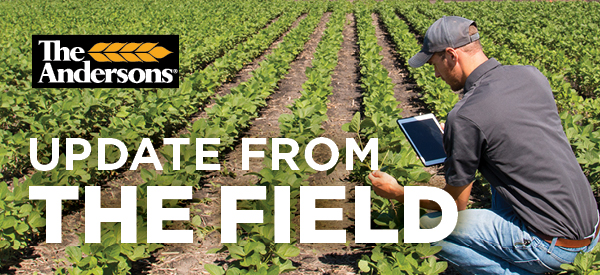Update from the Field: Tip Toe Through the Tulips
Posted by Dave Dyson, Agronomist on December 10, 2018
This post may reference products and/or services only available to our Retail Farm Center customers. For more information contact your Territory Manager at The Andersons.

Given the recent rains and soggy soils that have plagued us this fall, compaction should be on everyone’s mind. With the ever-increasing size of tractors and equipment, compaction can become a problem that will limit yield potential. How big the problem is will be determined by what kind of soil compaction is causing the problem.
There are two types of compaction farmers must be aware of, topsoil compaction and subsoil compaction. Topsoil compaction is due to ground contact pressure only, whereas subsoil compaction is directly related to axle load.
Ground contact pressure is the pressure that is exerted by a tire or track on the soil surface, expressed in pounds per square inch (psi). Reducing contact pressures will cause less topsoil compaction. In completely flexible tires, surface contact pressure is similar to tire pressure. With most farm tires, surface contact pressure is about one to two psi higher than tire pressure due to stiffness in the tire. The best way to determine contact pressure is to calculate the load in pounds per wheel and divide it by the area of the tire that touches the soil (in square inches). This will give you the average contact pressure under that tire in psi. Research shows yields can be reduced by as much as 10% due to soil compaction in the top soil. This compaction can be easily remedied with tillage and the natural freeze and thaw cycle.
Axle load is the total load supported by one axle, usually expressed in tons or pounds. Farm equipment with high axle loads will cause deep compaction. Deep subsoil compaction can only partially be alleviated with subsoil tillage, and at considerable cost. Freezing/thawing and drying/wetting cycles have been shown not to improve soil compaction at this depth. Research shows yields can be reduced by up to 15% with this type of compaction and will last up to 12 years. This type of compaction should be avoided at all cost. Soils that are near or at their water holding capacity will act like a hydraulic ram and will drastically increase the chances of both surface and subsoil compaction.

Figure 1: Axle load has a significant impact on soil compaction. To avoid damaging compaction, try to encourage axle loads under 7 tons. Source: PennState Extension.
Sometimes compaction cannot be avoided due to getting crops out of the field, and we need to deal with compacted soils. The reason compacted soils reduce yield is through restricting the roots from acquiring nutrients. If soils become compacted, we have to spoon-feed the small emerging plants. We can provide nutrients close to the roots without fear of burning the delicate root tissues with a high-quality low-salt starter.

Figure 2: Deep compaction can last years and be very difficult to correct. Source: PennState Extension.
In conclusion, even the slightest compaction can cause a yield reduction and should be avoided. Driving on saturated soils can lead to long term damage and yield reduction. Keeping loads in the field as light as possible and driving on travel lanes will help in the majority of cases.
FOR MORE INFORMATION:
Please complete the form, and we’ll get you in touch with your Territory Manager from The Andersons.

Dave Dyson is a regional agronomist for The Andersons’ Farm Centers which are located throughout Ohio, Michigan, and Indiana. He is an Indiana native and grew up on a dairy farm in Miami County. A graduate of Purdue University with a degree in Crop & Soil Science, Dave has a deep knowledge of various agronomic topics and is committed to helping growers improve their crops. If you have any questions, Dave can be reached at david_dyson@andersonsinc.com.


